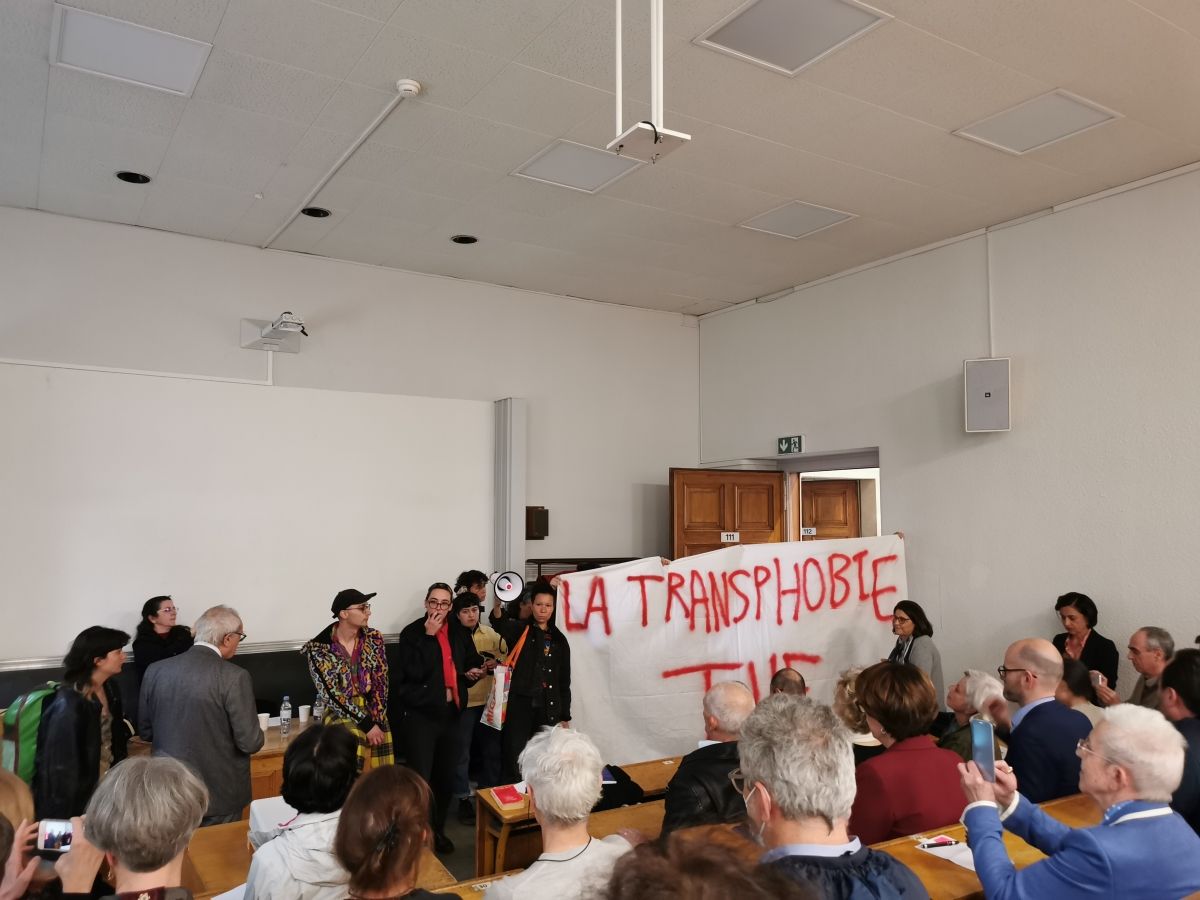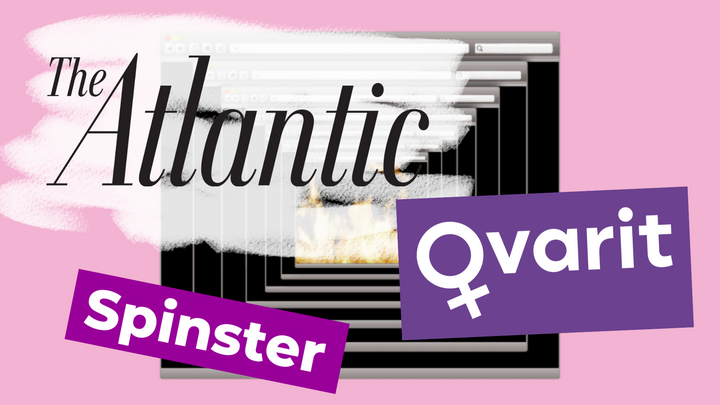Biology Forbidden: Europe’s Universities Get Swept Up in Gender Ideology
EU trans-rights activists play catch-up with their anglosphere peers

As of July 2022, there have been 235 recorded cases of academic cancellations in the United States and Canada, according to an independent American watchdog. In Europe, there’s no such body keeping track of things. But that doesn’t mean it’s not happening.
Imported ideas about gender ideology have invaded the course curricula of some of the continent’s most prestigious places of learning. A number of French, Spanish and German universities have fallen victim, though the ones documented here may only be the tip of the iceberg. The Dutch and the Swiss have managed to push back just a little, but if the American model is anything to go by, it is only likely to ramp up as activists use the power of campus protests and social media shaming to get the administrators to bow to their will.
Humboldt gets humbled
Marie Luise Vollbrecht, a doctoral student in biology and behavioral physiology at Humboldt University in Berlin, is probably the most high-profile European case. Her first foray into the public discourse was in June of this year when she co-penned a letter critical of the gender messaging being beamed out by public broadcasting channels. (The letter, published in one of Germany’s most popular daily broadsheets, Die Welt, inspired a Europe-wide version in July).
Vollbrecht and her co-authors sat through hours of TV shows, radio reports and social media posts to find out how taxpayer money was being used to educate German children about their bodies. What they found was shocking, from videos about what it’s like to be raped, how it feels to be raped by your grandfather, to be stabbed, to shoot a porn movie (featuring a convicted child molestor), alongside all the usual non-scientific nonsense about female phalluses and male menstruation.
But their plea seemed only to rile the country’s indignant, identitarian left - as well as the mainstream press and many in the political establishment. In a shocking turn of events, the CEO of Die Welt’s publisher summarily denounced the letter.
A few weeks later, Ms Vollbrecht was all set to give an evening talk at a public science event on human biology at her own university. The theme was disinformation, and her take, as a biologist, was that sex and gender are being mixed up by the media. (Confusingly, they are the same word in German—Geschlecht). Her plan to describe the biological reality of sexual dimorphism was discovered by student activists, so Humboldt University leaders cancelled the "transphobic" talk mere hours before the start time. With trans-rights activists rallying, they said, there was a security risk to the elderly and children who would be among the audience. The university claimed police had told them that counter-protesters were also on their way.
German feminists were indeed communicating about how to support Ms Vollbrecht, but only about 15 women were involved, and they only discussed going after the event had already been cancelled. The university refused to provide evidence of the “80-90 counter-protestors” whose communications the local police said they had intercepted.
Finally, in a hastily-planned panel of trans activists, historians, university admin and Ms Vollbrecht’s doctoral supervisor (Ms Vollbrecht declined to participate), the conclusion was reached that the university should never have allowed her to give such a presentation given her lack of subject area expertise and that they would better screen applicants for such events in the future. The incident seemed to be put down to her lack of credentials, not the sensitivity of the subject or the disruptive nature of the activists.
It was not the full-throated defence of free speech one would hope to hear from Berlin’s oldest university. In the weeks that followed, Vollbrecht’s life has been torn apart. Without getting too into the weeds, she got dragged into Twitter spats and has now been accused of holocaust denial in a country in which that’s an actual crime (the accusation seems to be utterly false). She then defended herself vociferously enough that she is now being sued. Meanwhile, the free speech debate that it sparked in Germany rages on.
Vollbrecht’s transphobia is pretty run of the mill, as awful as that is to say. But here she’s taken several steps much further: she has equated trans people with their own murderers, then denied their persecution, then claimed that if they WERE killed it was their own fault. 16/
— Dr. Bodie A. Ashton (@manwithoutatan) July 30, 2022
Queer theory, regurgitated, returns to its native France
Similarly, in October 2019, the University of Bordeaux submitted to activist pressure to cancel the appearance of the philosopher Sylviane Agacinski who was due to give a (disapproving) talk on reproductive technologies. She is vocally against IVF and surrogacy, and thinks that technology is bad for women. She was accused of homophobia and transphobia, and the university admin promptly called off her "dangerous" talk. In that case, however, politicians from across the spectrum registered their concern about the illiberal decision to cancel.
More recently, in December 2021, the Reims campus of the prestigious Sciences Po university, where many of the French political elite are educated, cancelled a new course called Evolution, biology and gender, one month after it had been okayed by the academic dean, and mere days before it was due to open for registration.
The course had been first proposed—and accepted—in 2019. Due to be given by doctor in political science Leonardo Orlando and doctor in philosophy, journalist and public intellectual Peggy Sastre, it was cancelled then, too, the reason given being “lack of enough number of students on campus” though 4W has been provided with evidence to suggest otherwise.
The profs were suspicious that it had something to do with the increasingly taboo nature of their ideas. Dr Orlando uses evolutionary psychology to study politics and political behavior. Ms Sastre, meanwhile, is an author of books on biology, evolution and gender. She is also the initiator of the controversial 2018 letter signed by prominent French women that pushed back against the excesses of the #MeToo movement. She is despised by many mainstream feminists.
In December 2021, the same thing happened again—after having been accepted, the course got cancelled a month later. This time, we know a little bit more about what went on behind the scenes. According to a report in the newspaper L’Express, the decision to cancel the course was sparked by a phone call from the university’s gender watchdogs, called "Presage." The body is empowered to certify courses that they deem equip Sciences Po graduates with "solid knowledge of gender studies to promote them in the professional world." This certification is ostensibly the only power the group has over programming. Presage seems to be on a mission to embed gender ideology in all disciplines across all campuses of Sciences Po. The Orlando-Sastre course, they had decided, would not be eligible for this certification.
But L’Express reported that the problem lay with Peggy Sastre. “Are you aware of her reputation?”, Presage asked the academic authorities of the campus. The university, however, in a statement claimed that (this time round) the course was cancelled for purely scientific reasons. It doesn’t “satisfy the scientific standards of the institution,” they said.
“Mr. Orlando intended to present evolutionary psychology theory despite not having the necessary scientific qualifications.” However, about Ms Sastre, they claimed that her ideas “could go so far as to legitimise rape,” an objectively ideologically-grounded reason, regardless of what you think of her opinions.
Ms Sastre, who is critical of orthodox feminism that denies biology, told 4W: “The first time we assumed it was hidden censorship and we gave them the benefit of the doubt.” The second time, however, suggested that it’s the teaching of biology that has become taboo. “Scientists are afraid. I have been contacted by scientists who said they support me but can’t comment publicly. They say they are sorry.”
“Fear propagates very easily and you don’t even have to have a reason. A monkey who sees another monkey being afraid - it’s not because he sees the cause of the fear. It’s a spiral of silence.”
“At some point someone dares to speak.”
Another course of Dr Orlando’s was cancelled at the same time, for the same stated reason. While it didn’t concern gender explicitly, Evolutionary political psychology was intended to illuminate students on the biological and evolutionary causes of human behavior. However, Sciences Po called that off, too, at the last minute. Meanwhile, there are currently 80 courses on offer on gender by the university, and not a single one touches on biology - some even deny it.
The Spanish nonquisition
Two recent events in Spain mirror the French cases. José Errasti and Marino Pérez Álvarez, from the Faculty of Psychology at the University of Oviedo, wrote a book called Nace en un cuerpo equivocado (Nobody is born in the wrong body). They were due to talk about it at the University of the Balearic Islands in April 2022. “We already knew a week before that there were going to be protests and rallies against it,” said Professor Marino Pérez, according to a report in La Razon, “which is a legitimate way of expressing an opinion and we thought it was acceptable.”
“Little by little, more disturbing posters and calls were arriving, including photos of us with our eyes crossed out. And the night before, an internal document of the activists was intercepted,” he said. The detailed plans showed how the activists planned to put a stop to the event.
José Errasti said that an hour before the event, the rector informed them that it had been called off because they couldn’t guarantee their safety. The rector, Jaume Carot, said it “hurt him” to have to cancel it because it goes against the principles and values of the institution.
But a public statement that followed made no reference to the threats from the activist groups. It simply referred to the "impossibility of guaranteeing security measures,"which could mean anything, when in fact, their inability to guarantee safety was directly caused by the violent nature of the protests. The rector clarified, too, that he wholeheartedly rejects transphobia, giving the impression he was trying to distance himself and the university from the speakers’ ideas.
ARA MATEIX‼️‼️ Els @mossos agredeixen activistes LGBTI que volen impedir la presentació d'un llibre amb contingut transfòbic a @casadellibro (rambla Catalunya)
— Crida LGBTI (@CridaLGBTI) May 16, 2022
‼️VINE A DONAR SUPORT! pic.twitter.com/scrKvKqI9x
Meanwhile, in July this year, a Masters program taught since 2015 at the Universita Autonoma de Barcelona has been "renovated" to suit contemporary sensibilities, according to a report in Ara. The changes involve permanently removing the Advertising, a socializing agent course, given by professor Juana Gallego (the founder of the gender and communication program) and the workshop Personal and professional empowerment through communication by professor Maden Castillo.
The phone call alerting the two professors to the cancellation took them by surprise. They told Ara that they see "no academic reason" for the deletion of the content and claimed that the motivation is due to the ideological position that the two teachers have made public against the current approach to the trans law. The university denied this.
Professor Gallego, who has been teaching and writing about gender and communication for almost 35 years, told 4W: “It is obvious that my personal pronouncements about some issues (gender identity, trans law, gender self-ID etc.) are not in line with the teachers and coordinator of the Masters program. I am very critical about some concepts that are now accepted as if they were agreed upon.”
“But they are just theories, not scientific evidence that can sustain a particular position. I think society must discuss publicly many of these concepts that are currently impossible to question: gender self-ID, puberty blockers, hormone treatment, sex change, and its social implications, etc. This is not a minor subject, but a very important challenge in which all of society must be actively involved.”
Dutch courage, and the Swiss refuse to submit
In January, the website of the independent university newspaper of Maastricht University’s Observant website went black for several days following a cyberattack by radical activists. The activists accused the magazine of using "transphobic" language in an article about periods that referenced women as the users of menstrual products. A campus activist group demanded that "women" be changed to "people," or removed. Otherwise, they said, “we will mobilise our community.”
However, editor Riki Janssen refused to back down, writing, “this concerns a rather new discussion in the gender domain which still has not been crystalised in generally accepted conclusions.” Maastricht University president Rianne Letschert called the cyberattack “shocking,” saying it affected freedom of the press and freedom of speech. “If you disagree with something, or if you have a difference of opinion, you have a respectful debate about it.”
Meanwhile, in Switzerland University of Geneva leaders have also refused to submit to the mob. After trans rights protestors disrupted an event they deemed transphobic for the second time in three months, the university announced it would file a criminal complaint against the protestors. (The student’s union, in turn, accused them of repression.)
The talk in question was a presentation of the book The sex of moderns by Éric Marty, a professor at Diderot University in Paris.

In a television interview, the rector of the university Yves Flückiger said the protesters had crossed a line and attacked academic freedom. Speaking to the local Tribune de Genève newspaper, he added: “People who fear books have never been on the right side of history. We need critical approaches, dialogue. No burnings.”
While the Dutch and Swiss examples offer hope, the danger of ideological capture in Europe’s hallowed institutions of higher learning is very real. Gender activists are not demanding freedom of speech, but freedom from certain speech, in a power play with university administrators who are terrified of bad PR.
Do you want to bring the "gender madness" to an end? Help us write about it! 4W is able to support our all-female staff and writers thanks to the generous support of our paid monthly subscribers.
Enter your email below to sign in or become a 4W member and join the conversation.
(Already did this? Try refreshing the page!)





Comments